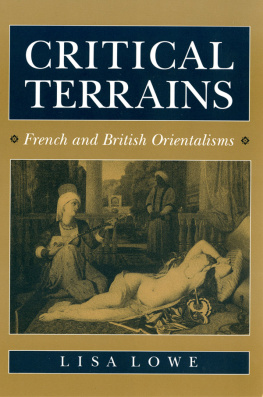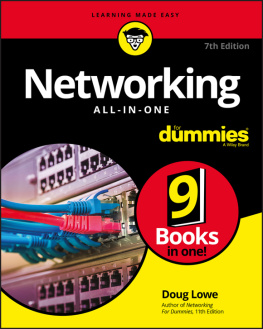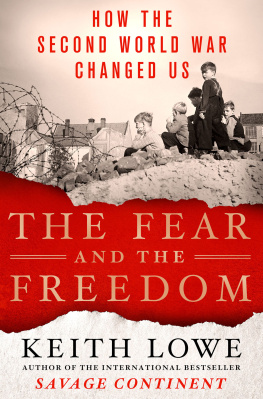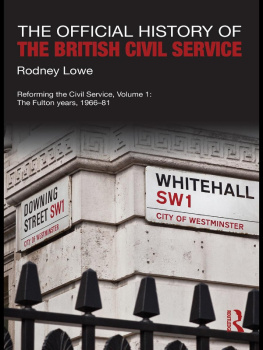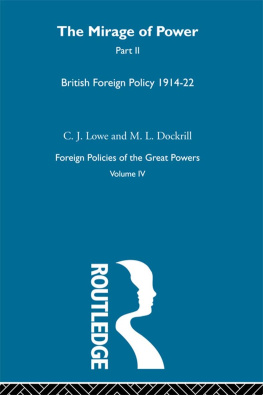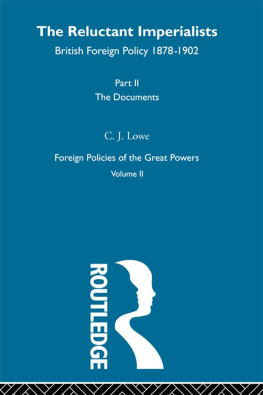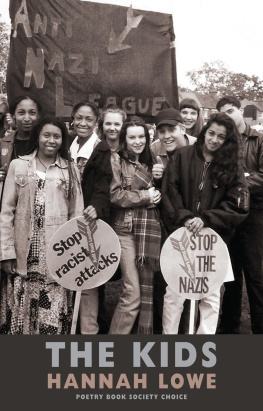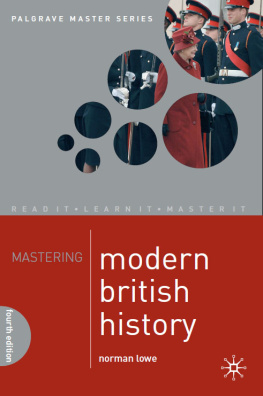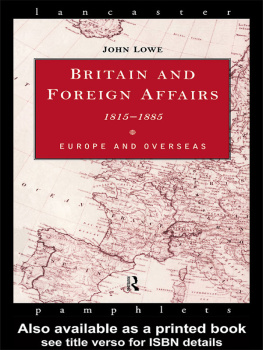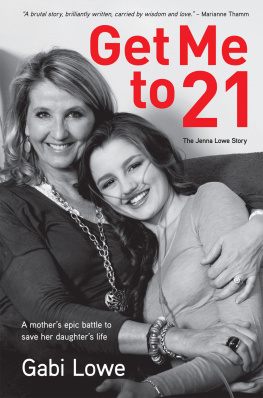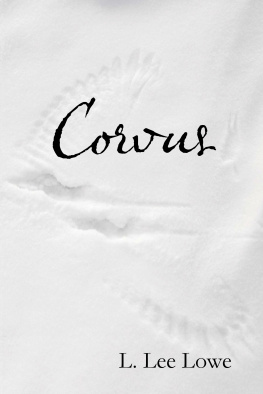Lowe - Critical terrains: French and British orientalisms
Here you can read online Lowe - Critical terrains: French and British orientalisms full text of the book (entire story) in english for free. Download pdf and epub, get meaning, cover and reviews about this ebook. City: Englisch;Frankreich;Französisch;Großbritannien;Ithaca;Orient;Orient (Motiv);Asia, year: 1994;2018, publisher: Cornell University Press, genre: Politics. Description of the work, (preface) as well as reviews are available. Best literature library LitArk.com created for fans of good reading and offers a wide selection of genres:
Romance novel
Science fiction
Adventure
Detective
Science
History
Home and family
Prose
Art
Politics
Computer
Non-fiction
Religion
Business
Children
Humor
Choose a favorite category and find really read worthwhile books. Enjoy immersion in the world of imagination, feel the emotions of the characters or learn something new for yourself, make an fascinating discovery.
Critical terrains: French and British orientalisms: summary, description and annotation
We offer to read an annotation, description, summary or preface (depends on what the author of the book "Critical terrains: French and British orientalisms" wrote himself). If you haven't found the necessary information about the book — write in the comments, we will try to find it.
Lowe: author's other books
Who wrote Critical terrains: French and British orientalisms? Find out the surname, the name of the author of the book and a list of all author's works by series.
Critical terrains: French and British orientalisms — read online for free the complete book (whole text) full work
Below is the text of the book, divided by pages. System saving the place of the last page read, allows you to conveniently read the book "Critical terrains: French and British orientalisms" online for free, without having to search again every time where you left off. Put a bookmark, and you can go to the page where you finished reading at any time.
Font size:
Interval:
Bookmark:

for Mei Lee Lowe
and Donald M. Lowe
This book treats orientalism as a tradition of representation that is crossed, intersected, and engaged by other representations. The object is not to describe a continuous history of literary orientalism, nor is it to identify a unified and consistent meaning of the notion of the Orienttasks perhaps more appropriate to a traditional literary history or history of ideas. Rather, I consider here four disparate and nonanalo-gous orientalist situations and argue the contrary: that orientalism is not a single developmental tradition but is profoundly heterogeneous. French and British figurations of an oriental Other are not unified or necessarily related in meaning; they denote a plurality of referents, do not necessarily have a common style in the production of statements about their Orients, and are engendered differently by social and literary circumstances at particular moments. Although this project has benefited from the critique established in Orientalism (1979), by Edward Said, who holds that there is a discernible history of European representation and appropriation of the Orient, and that this history has a relationship to the history of European colonialism, my study ultimately challenges that work to the extent that I query the assumption that orientalism monolithically constructs the Orient as the Other of the Occident. In each chapter I consider a specific form of orientalism and contend that each orientalist situation expresses a distinct range of concerns with difference: the conflicts and collaborations among narratives of cultural, class, and sexual differences in eighteenth-century English and French travel literature; the discourses of orientalism, romanticism, racialism, and capitalism in the corpus of Gustave Flaubert; the Anglo-American and Indian literary critical debates about E. M. Forsters novel A Passage to India ; and finally, the utopian projection of China in French post-structuralism, represented by the work of Julia Kristeva and Roland Barthes, and in the journal Tel quel. The purpose of distinguishing among four distinct orientalist situations is to challenge critical perceptions of a consistent, univocal discourse that dominates, manages, and produces cultural differences, an oversimplification proliferated in certain criticism since the publication of Saids book. My work ultimately rejects a totalizing framework that would grant such authority to orientalism, and that would understand all forms of resistance to be contained by that single determining tradition. I also argue strongly for the heterogeneity of the orientalist object, whose contradictions and lack of fixity mark precisely the moments of instability in the discourse; although orientalism may represent its objects as fixed or stable, contradictions and noncorrespondences in the discursive situation ultimately divulge the multivalence and indeterminability of those fictions. It is through this attention to the heterogeneity of objects that the interpreted texts of my study come to represent an incongruous variety of orientalist examples. In discussing these differently unstable moments of French and British orientalism, I suggest ways in which interventions in managing or colonizing discourses, such as orientalism, are observable from our postcolonial position and can indeed be located in the heterogeneity of different textual, intertextual, and discursive situations. Even so, as I write this, I am forced by recent events in the Persian Gulf to acknowledge the persistent legacy of orientalism. These events demand that questions of resistance be more than theoretical, and remind us that despite practical resistance, newly configured orientalisms will continue to demand our critical attention.
During the years I worked on this project, many people offered me their interest and attention. I am most grateful to Page duBoisteacher, mentor, and friendwho helped and inspired me at all stages. I especially acknowledge Susan Kirkpatrick, whose clarity of mind and generous comments made it possible for this book to say what it needed to say. Kathryn Shevelow guided me to Lady Mary Wortley Montagu; and Stephanie Jed was a uniquely sympathetic reader. Other colleagues and friends at the University of California, San DiegoMasao Miyoshi, Roddey Reid, Rosaura Sanchez, Don Wayne, and Winnie Woodhulloffered helpful questions, criticism, and encouragement; among them, George Mariscal has been an important interlocutor. I am grateful to former teachers for having opened, each of them, very different intellectual doors: Harry Berger, James Clifford, the late Joel Fineman, Donna Haraway, Fredric Jameson, Kristin Ross, and Hayden White. Equally, I thank Ian Barnard, Luis Madureira, and Margaret Sale, graduate students with whom I have worked at UCSD, for asking me stimulating questions. I am also indebted to a variety of readers, some of whom provided comments at an early stageSandra Azeredo, Deborah Gordon, Barbara Gottfried, Christine Grella, Julie Hemker, Marta Morello-Frosch, and Cathy Rebackand others who, at a later stage, offered me enormously instructive conceptual adviceNancy Armstrong, Cora Kaplan, and David Lloyd. Ultimately I must thank Edward Said, not only for having written Orientalism but also for his gracious encouragement.
A fellowship from the American Council of Learned Societies and research and sabbatical leaves from UCSD have permitted me to complete the writing and editing of this book. Chapter 2 includes a revised version of an essay published as Rereading Orientalism: Oriental Inventions and Inventions of the Orient in Montesquieus Lettres per-sanes, in Cultural Critique 15 (Spring 1990): 11543; Chapter 3 contains revised portions of two essays, The Orient as Woman in Flauberts Salammb and Voyage en Orient , Comparative Literature Studies 23, no. 1 (Spring 1986): 4458; and Nationalism and Exoticism: Nineteenth-Century Others in Flauberts Salammb and Lducation sentimentale, in Macropolitics of Nineteenth-Century Literature: Nationalism , Exoticism , Imperialism , ed. Jonathan Arac and Harriet Ritvo (Philadelphia: University of Pennsylvania Press, 1991). I thank each for permission to republish these materials here. Ideas for a few chapters were presented as papers at meetings of the Modern Language Association and the Philological Association of the Pacific Coast. Many of the literary and theoretical texts I have treated in Chapters 2, 3, and 5 exist only in French; unless I note otherwise, I have translated these texts myself, citing the French when I felt my translation could not capture the ambiguity or nuance of the original.
Above all, there are two to whom I give other than intellectual acknowledgment: Joseph Nebolon, for his equanimity and unwavering support, and Juliet, who delights, and gives me reason.
L ISA L OWE
San Diego, California
Par la diversit de son humeur, tour tour mystique ou joyeuse, babillarde, taciturne, emporte, nonchalante, elle allait rappel-ant en lui mille dsirs, voquant des instincts ou des rminiscences. Elle tait lamoureuse de tous les romans, lhroine de tous les drames, le vague elle de tous les volumes de vers. Il retrouvait sur ses paules la couleur ambre de l odalisque au bain ; elle avait le corsage long de chtelaines fodales; elle ressemblait aussi la Femme ple de Barcelone, mais elle tait par-dessus tout Ange!
[According to her changing moods, in turn meditative or gay, talkative, silent, passionate, and nonchalant, she awakened in him a thousand desires, called up instincts or memories. She was the beloved mistress of all the novels, the heroine of all the dramas, the vague she of all the volumes of verse. On her shoulders, he rediscovered the amber color of Ingress Odalisque au bain; her waist was long like the feudal chatelaines; she resembled the Femme Pale de Barcelone, but above all, she was a complete Angel.]
Next pageFont size:
Interval:
Bookmark:
Similar books «Critical terrains: French and British orientalisms»
Look at similar books to Critical terrains: French and British orientalisms. We have selected literature similar in name and meaning in the hope of providing readers with more options to find new, interesting, not yet read works.
Discussion, reviews of the book Critical terrains: French and British orientalisms and just readers' own opinions. Leave your comments, write what you think about the work, its meaning or the main characters. Specify what exactly you liked and what you didn't like, and why you think so.

